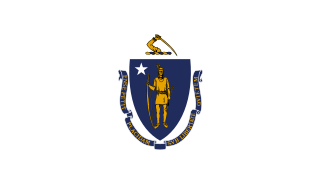| |||||||||||||
| |||||||||||||
 County results Counties won by King | |||||||||||||
| |||||||||||||
The 1820 Maine gubernatorial election took place on April 3, 1820. It was the first election for Governor of Maine, taking place after Maine separated from Massachusetts and was recognized as a state on March 15, 1820. Maine's separation from Massachusetts came as a result of The Missouri Compromise. This election saw the virtually unanimous election of William King, the man most chiefly responsible for the push for Maine statehood. He had no opponents.

The Governor of Maine is the chief executive of the State of Maine. Before Maine was admitted to the Union in 1820, Maine was part of Massachusetts and the Governor of Massachusetts was chief executive.

Massachusetts, officially the Commonwealth of Massachusetts, is the most populous state in the New England region of the northeastern United States. It borders on the Atlantic Ocean to the east, the states of Connecticut and Rhode Island to the south, New Hampshire and Vermont to the north, and New York to the west. The state is named after the Massachusett tribe, which once inhabited the east side of the area, and is one of the original thirteen states. The capital of Massachusetts is Boston, which is also the most populous city in New England. Over 80% of Massachusetts's population lives in the Greater Boston metropolitan area, a region influential upon American history, academia, and industry. Originally dependent on agriculture, fishing and trade, Massachusetts was transformed into a manufacturing center during the Industrial Revolution. During the 20th century, Massachusetts's economy shifted from manufacturing to services. Modern Massachusetts is a global leader in biotechnology, engineering, higher education, finance, and maritime trade.

William King was an American merchant, shipbuilder, army officer, and statesman from Bath, Maine. A proponent of statehood for Maine, he became its first governor when it separated from Massachusetts in 1820.






